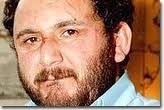
They are obsessed with secrecy and symbolism, arcane codes and structures, they have messianic tendencies and are prone to extreme violence. Clare Longrigg asked psychiatrist Corrado De Rosa, don’t you need to be a bit mad to be a Mafioso?
‘Ask Giovanni Brusca what he was thinking when he pressed the button to blow up judge Falcone and his escort,’ says the psychiatrist. ‘He wasn’t thinking anything. He was carrying out a sentence.
‘Membership of Cosa Nostra is about a way of being. It defines who you are. While membership of the Naples mafia, the Camorra, is about having. People join the Camorra because it offers them an image: they can become somebody, they can be rich.
‘Cosa Nostra boss Bernardo Provenzano was arrested in a shepherd’s hut in the mountains. He had some ricotta cheese, a few old vegetables, a bible, and not much else. He was so powerful, he was the personification of Cosa Nostra, so he could live without showing it.’
In a recent documentary shown on the BBC, historian John Dickie, author of Mafia Republic, uncovered the mafia’s underground bunkers. In sunken containers and subterranean labyrinths, Ndrangheta bosses live for weeks, avoiding arrest. For such wealthy and powerful men, I ask psychiatrist de Rosa, isn’t there something a bit insane about living in a windowless crater underground?
‘It’s just a means to an end,’ says De Rosa: they will do anything to avoid prison – even living behind a cement wall.
Cosa Nostra takes over the minds of its members. It redefines what is normal. Obedience is normal, even if it means killing a member of your own family. But what about the obsessive attention to rules and codes, the homophobia, and cult-like hero worship. Isn’t that a bit crazy? Clinging to power for its own sake, doesn’t that make a person mad?

‘There are certain personality traits that make a successful mafia boss,’ he explains. ‘Raffaele Cutolo (boss of the Naples Nuova Camorra Organizzata) is a narcissist. Definitely paranoid. There are some who are religious fanatics. And they have a higher than normal propensity to violence. These are all characteristics we find in mafia bosses. If we start saying they’re signs of insanity, we get into dangerous territory. Are we going to start saying they’re not responsible for their actions?’
The mafioso Leonardo Vitale, was drawn into Cosa Nostra as a young man by his family. By his own account he was afraid he might be homosexual, and needed to prove his manhood. Years later, in 1973, he had a mystical crisis, and confessed everything he knew to the police.
He was a very troubled man, in prison psychiatric units he covered himself in faeces, and self-harmed. In court, the mafia’s defence lawyers successfully undermined his evidence by saying he was insane. When his information was eventually corroborated by the supergrass Tommaso Buscetta, Vitale was released. Within days the mafia had him killed.
Leonardo Vitale was certifiably insane, but what he said about the mafia was true.
Is it possible that behind the meticulous adherence to made-up codes of honour, there is hidden insanity? I am still after a diagnosis for the levels of cynicism and violence we see in mafia behaviour.

‘It’s clear that life in Cosa Nostra fuels paranoia,’ says De Rosa. ‘A high level boss, Totò Riina for example, is to a certain extent, a psychopath. But not Provenzano. He is expert at manipulating people, which you can’t do if you don’t understand them, understand their weaknesses and their motivation.
‘If you really want to study the psychological profile of Mafiosi, it would be interesting to look at their children. Those, like Provenzano’s sons, who are kept out of the organization, undergo a profound identity crisis.’
De Rosa is an engaging conversationalist, with a wide ranging knowledge of the mafia across southern Italy. I hope I’ll have more to follow on this topic.
Mafia da Legare by Corrado De Rosa is published by Sperling & Kupfer